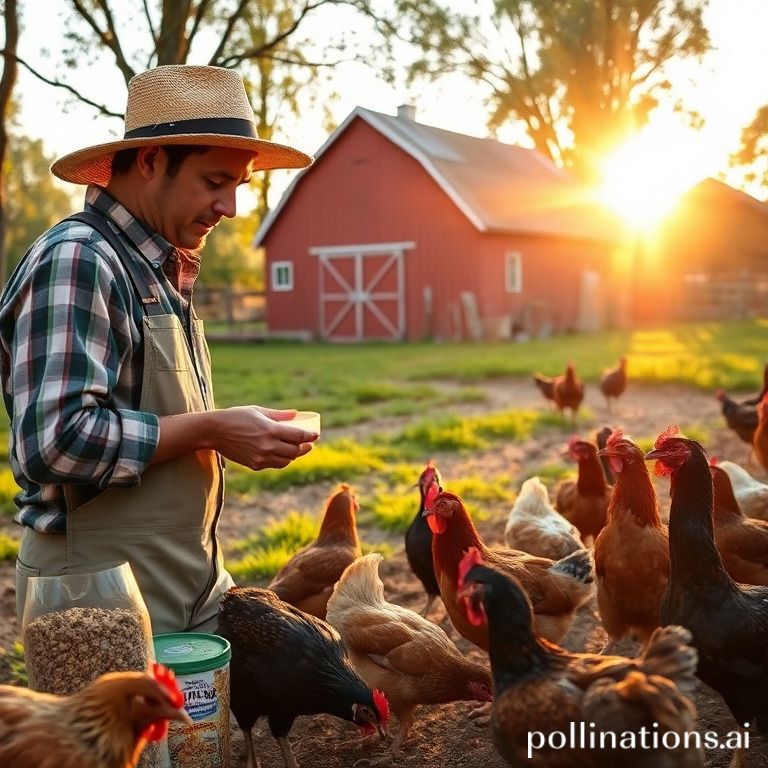How much should I feed chickens? It’s a question that every chicken owner asks themselves. Providing the right amount of food is crucial to keeping your feathered friends healthy and well-nourished.
Just like humans, chickens have specific dietary needs that must be met in order to thrive. Whilst it may seem simple, Evaluating the appropriate feeding quantities can be a bit more complex. Factors such as the chicken’s age, breed, and activity level all play a role in determining how much food they require. So, if you’re unsure about the proper feeding practices for your chickens, read on for some helpful guidelines and recommendations.
ZenxyHoC Chick Feeder and Waterer Kit
Convenient Feeding and Hydration for Your Chickens
Discerning the nutritional requirements of chickens
1. Factors influencing the amount of food chickens need
Pertaining to Discerning the nutritional requirements of chickens, several factors play a role in influencing the amount of food they need. These factors include:
- Breed: Different chicken breeds have different growth rates and metabolic needs, which directly affect their food requirements.
- Age: Chickens have different nutritional needs at different stages of life. Chicks need a diet rich in protein and minerals to support their rapid growth, Whilst adult chickens may require a more balanced diet.
- Weight: The weight of a chicken also determines its food requirements. Heavier birds generally need more food to sustain their energy levels and maintain proper body functions.
- Activity level: Active chickens, such as free-range or working chickens, need more food to support their increased energy expenditure.
- Environmental conditions: Factors like temperature and climate can impact a chicken’s metabolism and, therefore, its food requirements. Cold weather may increase the energy needs of chickens to maintain body heat.
2. Apprehending the different nutritional needs of chickens based on age and purpose
Feeding chickens properly involves Apprehending their specific nutritional needs based on both age and purpose. Here are some key considerations:
a. Nutrition for growing chicks:
Chicks have high protein requirements for proper growth and development. A starter feed with approximately 18-20% protein content is recommended for the first 6-8 weeks. After that, a grower feed with slightly lower protein levels can be provided until they reach maturity.
b. Nutrition for laying hens:
Laying hens require a well-balanced diet to support egg production. A layer feed with approximately 16-18% protein is essential, along with calcium-rich supplements to ensure the development of strong eggshells.
c. Nutrition for meat chickens:
Meat chickens, also known as broilers, have high protein requirements for rapid muscle growth. A broiler feed with approximately 20-22% protein content is recommended to achieve optimal growth and meat quality.
d. Nutrition for breeding chickens:
Breeding chickens need a diet that supports fertility and reproductive health. A breeder feed with balanced nutrients, including protein, vitamins, and minerals, is essential to ensure successful breeding and healthy offspring.

Guidelines for feeding chickens
Feeding chickens properly is crucial for their health and overall well-being. By conforming to these guidelines, you can ensure that your chickens receive the appropriate nutrition at each stage of their development.
1. Establishing a feeding schedule for chickens
Creating a feeding schedule is important to maintain consistency and avoid overfeeding or underfeeding your chickens. Here are some key points to consider:
- Frequency: Provide feed to chickens at least once in the morning and once in the evening.
- Consistency: Stick to a regular feeding time to establish a routine for your chickens.
- Portion control: Avoid leaving feed out throughout the day to prevent overeating.
2. The appropriate types of feed for different stages of chicken development
As chickens grow and develop, their nutritional needs change. It is important to provide them with the right types of feed at each stage. Consider the following:
- Chick starter: This feed is specifically formulated for newly hatched chicks and should be provided for the first few weeks.
- Grower feed: After the initial stage, switch to grower feed that meets the nutritional requirements of growing chickens.
- Laying feed: When chickens reach the laying stage, transition to a feed designed to support egg production.
3. Monitoring and adjusting the feeding quantity based on chicken behavior and condition
Observing your chickens’ behavior and condition can help you determine if you are feeding them adequately. Here’s what to consider:
- Appetite: If your chickens finish their feed quickly and still appear hungry, consider increasing the quantity.
- Weight management: Regularly assess your chickens’ weight to ensure they are maintaining a healthy weight.
- Health indicators: Monitor your chickens for signs of malnutrition or nutritional deficiencies, such as poor feather quality or decreased egg production.
| Feeding Schedule | Types of Feed | Monitoring and Adjusting |
|---|---|---|
| Establish a regular feeding schedule | Provide chick starter for young chicks | Observe appetite and weight management |
| Feed chickens at least twice a day | Transition to grower feed for growing chickens | Monitor health indicators for proper nutrition |
| Avoid overfeeding or underfeeding | Switch to laying feed when chickens start laying eggs | Adjust feeding quantity based on behavior and condition |
Factors to consider when Assessing the appropriate amount of food for chickens
Providing the right amount of food for chickens requires considering various factors that contribute to their overall health and well-being. By taking these factors into account, chicken owners can ensure that their feathered friends receive the necessary nutrition for optimal growth and productivity.
1. Evaluating chicken weight and body condition
The weight and body condition of chickens play a critical role in determining their food requirements. Regularly assessing the chickens’ weight and overall body condition is essential to ensure they are neither too thin nor overweight. Underweight chickens may need increased food quantities, Meanwhile overweight chickens may require a controlled diet to prevent health issues related to obesity.
2. Considering the breed and size of the chicken
The breed and size of chickens also affect their food consumption. Different breeds have varying growth rates and metabolic rates, which directly impact their nutritional needs. Larger breeds generally require more food than smaller ones due to their higher energy requirements. Perceiving the specific requirements of the chicken breed and size helps determine the appropriate portion sizes for optimal nutrition.
3. Perceiving the environmental factors that may affect chicken’s food consumption
Environmental factors can significantly influence a chicken’s food consumption. Factors such as temperature, humidity, and stress levels can impact their appetite. During colder months, chickens may require more food to generate body heat, Meanwhile excessive heat can reduce their appetite. Additionally, stressful conditions like overcrowding or the presence of predators can affect their food intake. Considering these environmental factors is important when Assessing the amount of food to provide.

Common errors to avoid when providing nourishment to chickens
It is essential to feed chickens properly to ensure their health and well-being. Despite this, there are certain mistakes that chicken owners often make In terms of providing nourishment to their feathered friends. By avoiding these common errors, you can make sure that your chickens receive the nourishment they need to thrive.
1. Overfeeding chickens and the resulting consequences
Overfeeding chickens can have negative consequences on their health. When chickens are given excessive amounts of food, they may become overweight, which can lead to health issues such as heart problems and reduced egg production. Additionally, overfeeding can result in wasted feed, increasing your expenses and attracting pests.
Consequences of overfeeding:
- Obesity
- Reduced egg production
- Increased risk of heart problems
- Wasted feed and increased expenses
- Pest attraction
2. Underfeeding chickens and its negative impact on their health
Nevertheless, underfeeding chickens can also have detrimental effects on their health. When chickens do not receive enough food, they may suffer from malnutrition, weakened immune systems, poor egg quality, and stunted growth. It is important to make sure that your chickens have access to an adequate amount of feed to meet their nutritional needs.
Consequences of underfeeding:
- Malnutrition
- Weakened immune system
- Poor egg quality
- Stunted growth
To determine the appropriate amount of food to feed your chickens, take into account factors such as their age, breed, size, and activity level. Consulting a poultry nutritionist or veterinarian can provide you with expert guidance tailored to the specific needs of your flock. Remember to also provide clean water at all times and monitor your chickens’ body condition to ensure they are receiving the right amount of food for optimal health.
| Information |
|---|
| Feeding chickens properly is crucial for their health and well-being. |
| Overfeeding can lead to obesity, reduced egg production, and increased expenses. |
| Underfeeding can cause malnutrition, weakened immune system, poor egg quality, and stunted growth. |
| Consult a poultry nutritionist or veterinarian for guidance on feeding quantities. |
Conclusion
Proper chicken feeding is of utmost importance for the overall well-being and productivity of chickens. By providing them with appropriate food quantities, we ensure their nutritional needs are met, resulting in healthier birds and higher egg production.
Throughout this article, we have discussed various guidelines and recommendations to help you understand how much to feed your chickens. Now, it’s time to put this knowledge into practice and implement these feeding strategies. By doing so, you will contribute to the optimal growth and development of your flock, ensuring their long-term health and happiness.
FAQ: Frequently Asked Questions about Chicken Feeding
FAQ 1: How often should I feed my chickens?
Chickens should be fed once or twice a day, depending on their age and needs. Young chicks require consistent access to feed, In the course of adult chickens can be fed once in the morning and once in the evening.FAQ 2: What is the recommended amount of feed per chicken per day?
On average, a chicken requires about 1/4 to 1/3 pound (or 4 to 5 ounces) of feed per day. In contrast, the exact amount may vary based on the chicken’s age, breed, and size. It’s important to monitor their weight and adjust the feed accordingly.FAQ 3: Can I free-feed my chickens?
Yes, you can choose to free-feed your chickens by providing them with constant access to feed throughout the day. In contrast, this method might lead to overeating and potential weight issues. It’s recommended to monitor their feed intake and adjust accordingly.FAQ 4: Should I provide additional supplements or treats to my chickens?
Supplements and treats can be given to chickens in moderation. It’s important to provide a balanced diet that includes essential nutrients. Treats should only make up a small portion of their overall diet to avoid nutritional imbalances.FAQ 5: How can I prevent my chickens from becoming overweight?
To prevent chickens from becoming overweight, it’s important to provide them with a balanced diet and monitor their feed intake. Avoid excessive treats and scraps, as they can contribute to weight gain. Encourage exercise by allowing them to roam and providing opportunities for foraging. Regularly assess their body condition and adjust their feed accordingly. By embracing these guidelines, you can ensure your chickens are fed properly and maintain a healthy weight. Remember to consider their individual needs and make adjustments as necessary.Read Similar Post:
1. Why Are The Chickens Dying?
2. Why Are There So Many Chickens On Maui?

